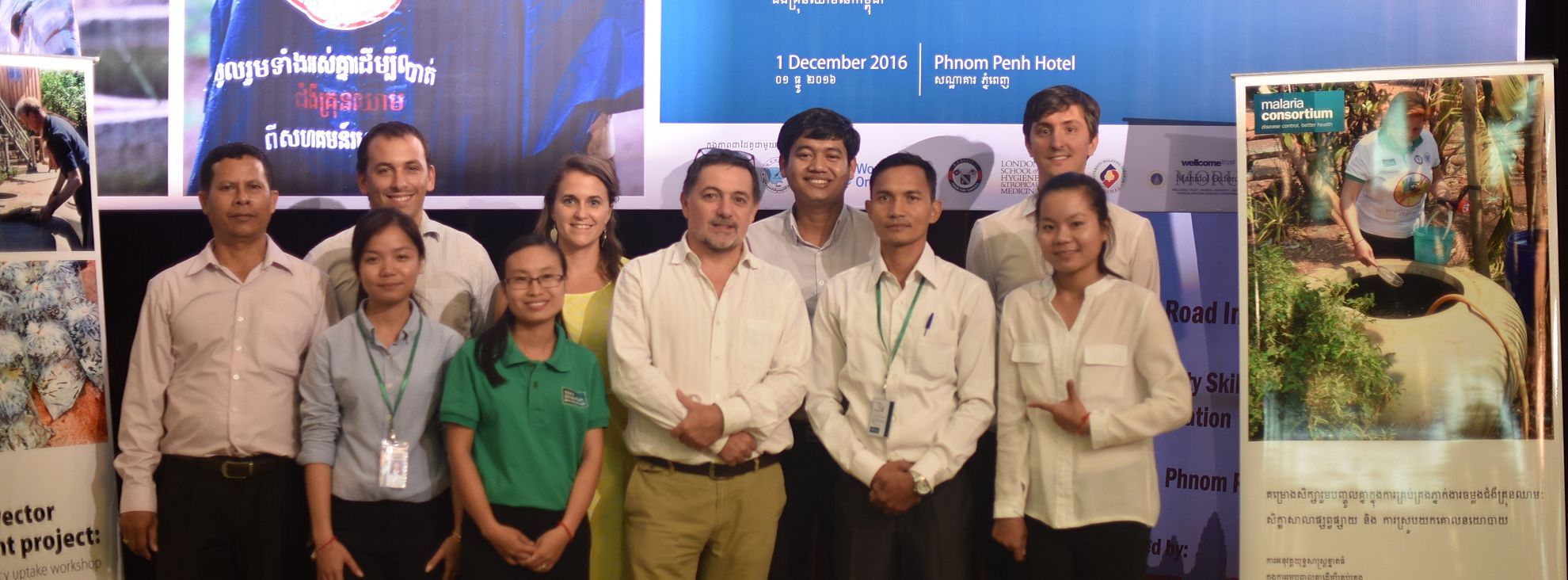
Malaria Consortium receives prize for grassroots solution against dengue in Cambodia
27 February 2017Malaria Consortium’s project ‘Implementing integrated vector management for dengue control’ has won the Break Dengue Community Action Prize at the ISNTD Festival in London. The jury selected the project out of almost 70 submissions.
The project uniquely combined and compared three interventions to reduce the dengue burden in one sustainable solution: guppy fish, a larvicide, and behaviour change communications. This approach proved to be a successful tool in combating dengue in Cambodia, as it is cost-effective, sustainable and acceptable to the community.
Cambodia has one of the highest per-capita incidence rates in the region with almost 200,000 cases were reported to the National Dengue Control Programme between 1998 and 2008.
Mosquitoes commonly breed in standing water near households and the use of guppy fish has proved to be very effective in reducing larvae in large water storage containers because they eat the larvae. For smaller containers where guppy fish cannot be used, we used a larvicide – a biological control method – which prevents the emergence of the adult mosquitoes. Both these vector control methods were used alongside a behaviour change strategy, central to which has been effective training of community health volunteers to be able to engage their peers in healthy behaviours.
At the end of the study, community members, volunteers and health centre staff revealed that the project has increased the community participation in dengue control. The number of dengue mosquitoes per household was significantly lower in areas where the three interventions were implemented.
The Break Dengue Community Action Prize offers €10,000 Euros for projects that maximise the impact of public health interventions by integrating the new vaccine into the anti-dengue arsenal. “This grant will allow us to enhance the behaviour change component of this initiative and will also be used to provide technical assistance to the Ministry of Health for the revision of the National Dengue Strategic Plan 2017-2020, ensuring that vaccination against dengue is considered a key component of the national response,” Sergio Lopes, Malaria Consortium Country Technical Coordinator , commented.
After attending the ISNTD Festival in London where the prize was announced, Malaria Consortium’s Chief Executive Charles Nelson said, “We are delighted to receive the prize. The study proved the acceptability of our approach and showed it can be easily sustained by communities at a low cost. We will continue to engage with the communities to take the next step in the battle against dengue.”
The project was co-funded by Deutsche Gesellschaft für Internationale Zusammenarbeit (GIZ) and UK Aid from the UK government. The Cambodian National Center for Parasitology Entomology and Malaria Control (CNM), the World Health Organization, Naval Medical Research Unit 2, the London School of Hygiene & Tropical Medicine, Mahidol Oxford Research Unit, and University Malaysia Sarawak collaborated on this research study.
Country: Cambodia
Keywords: Vector control
Related content
23 November 2016
Dengue: Falling between the cracks
28 November 2016Dengue integrated vector management project
Latest news
- Malaria Consortium honoured by Ugandan government for contribution to combat malaria23rd April 2024
- International summit calls for AMR accountability in public health interventions21st March 2024
- Global SMC community celebrates new milestone at SMC Alliance Annual Meeting in Nigeria6th March 2024
- Scaling up key interventions could halve pneumonia-related childhood mortality13th February 2024
- Malaria Consortium and eGov Foundation join Mozambique’s national malaria programme to digitalise seasonal malaria chemoprevention campaigns8th February 2024
- World’s first malaria vaccine rollout launched in Cameroon22nd January 2024